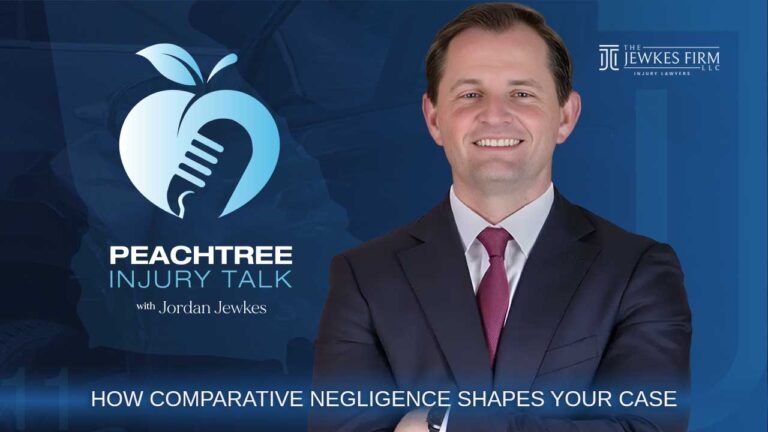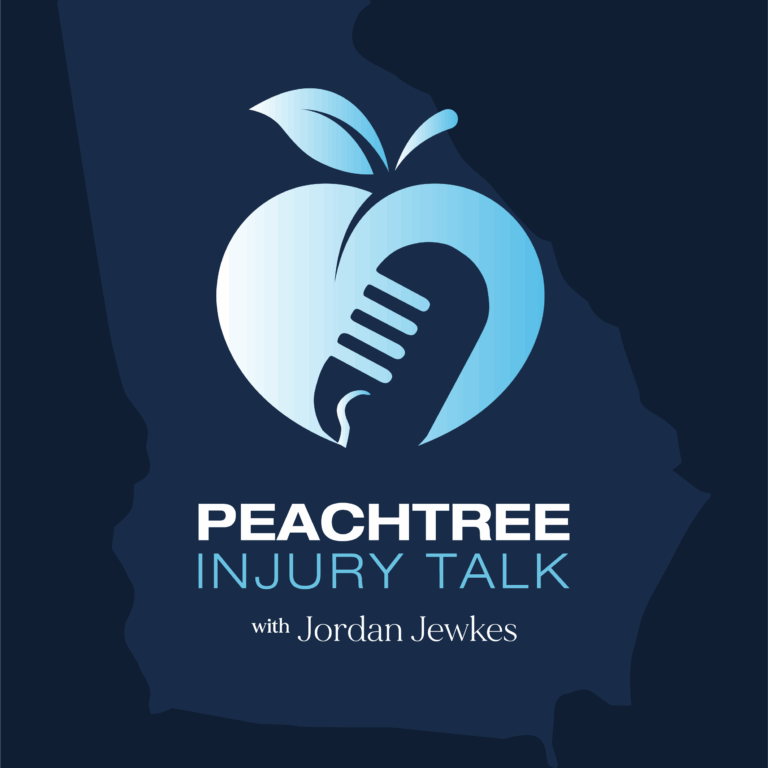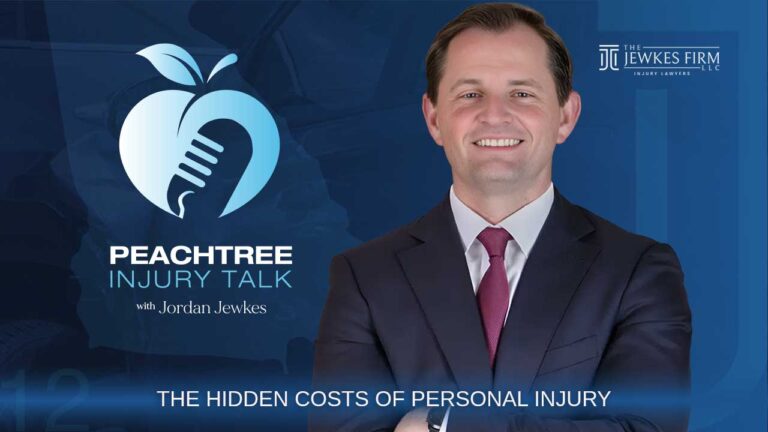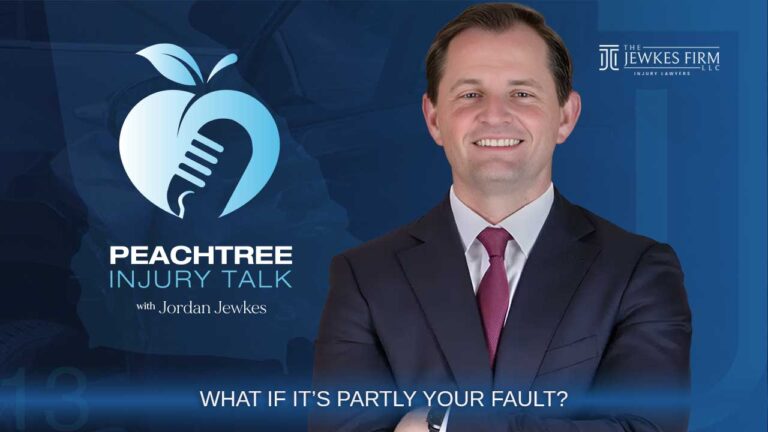| 00:00 |
Narrator: Welcome to Peachtree Injury Talk with attorney Jordan Jewkes.
|
| 00:05 |
Kevin Rosenquist: Welcome to Peachtree Injury Talk with attorney Jordan Jewkes. Jordan strives to give injured victims a voice and provide strong advocacy against an often broken system. I’m your host, Kevin Rosenquist, and today we’re going to talk about how to deal with difficult adjusters and what to do when these insurance companies aren’t playing fair. Jordan, good to see you.
|
| 00:27 |
Jordan Jewkes: Yeah, hey, thanks, Kevin. Good to see you too.
|
| 00:29 |
Kevin Rosenquist: You ready to rail against some insurance companies?
|
| 00:31 |
Jordan Jewkes: Always, man. That’s what I do. That’s what I love. That’s my favorite thing to do.
|
| 00:37 |
Kevin Rosenquist: What are some of the most common tactics you’ve seen insurance adjusters use to delay or deny a valid claim?
|
| 00:45 |
Jordan Jewkes: Yeah, I mean, look—years ago, adjusters used to try and fairly evaluate claims. Now it feels like they're just looking for any way to minimize or deny your claim. They’ll do all sorts of things:
- Outright deny your claim.
- Try to blame you for the wreck.
- Say your injuries weren’t caused by the wreck, that they were pre-existing or made up.
They’ll claim you had these injuries long before the accident and that the crash was just a “tap.” So, give adjusters credit—they’re very creative when it comes to minimizing payouts. And that’s exactly what they’re paid to do.
|
| 01:55 |
Kevin Rosenquist: What’s their incentive? Are they actually rewarded for reducing claim payouts?
|
| 01:59 |
Jordan Jewkes: Short answer: yes. Every insurance company is a little different, but generally, adjusters are incentivized to settle claims quickly and under something called the reserve.
When a claim is opened, the adjuster sets a reserve—basically, a budget or estimate of what they might pay on the claim. If they settle the case for less than that reserve and close it quickly, many companies bonus or reward them. So yes, they’re motivated to close fast and cheap.
|
| 03:16 |
Kevin Rosenquist: That makes sense. So what can people do to protect themselves from being pressured into a lowball settlement or admitting fault?
|
| 03:25 |
Jordan Jewkes: First, stay calm. Second, be wary of early offers. It’s extremely common for someone to get in a wreck and the next day be offered $500 or $1,000, maybe $1,500.
Why? Because insurance companies know many people don’t realize how injured they really are until days or even weeks later. And if they catch you early—before symptoms worsen—they might get away with settling your claim for pennies. It’s shady, no doubt.
So: don’t accept any settlement until you’ve gotten proper medical care and have a clear understanding of your injuries.
|
| 04:49 |
Kevin Rosenquist: It does seem shady—basically throwing money at people to make them go away, even if they’re seriously injured.
|
| 05:04 |
Jordan Jewkes: Right. And once you sign that release and cash that check, it’s very hard—almost impossible—to undo. We’ve had people call us weeks later saying, “I thought I was fine, but now I need surgery,” and unfortunately, they’re stuck.
That’s why I’d love to see the legislature allow people to rescind those agreements within 30 or 60 days. But right now, once it’s signed, it’s done.
|
| 06:40 |
Kevin Rosenquist: What if someone just doesn’t want to talk to the adjuster? Do they have to?
|
| 06:45 |
Jordan Jewkes: No, there’s no law saying you have to speak with an adjuster. Once you hire an attorney, we tell clients not to speak with the adjuster—especially about injuries.
We usually allow them to speak about vehicle damage, since they know more about their car than we do, but anything related to injuries needs to go through us. And if an adjuster tries to get around that, it’s unethical—and they know it.
|
| 07:51 |
Kevin Rosenquist: But they will try to sneak in those questions, right?
|
| 08:04 |
Jordan Jewkes: Oh, absolutely. That’s why we advise clients to say this, word for word: “I’ve hired an attorney. My attorney has advised me not to speak with you about my injuries. I can discuss my vehicle, but nothing more.” That usually shuts down any probing.
|
| 08:55 |
Kevin Rosenquist: Let’s talk about people who try to handle their claim without an attorney. What are the biggest pitfalls?
|
| 09:09 |
Jordan Jewkes: The biggest one is underestimating what you’re up against. Insurance companies have tons of data—decades of it. They’ve seen your exact situation thousands of times. They know what a good, bad, and great settlement looks like. And they will absolutely try to convince you that your case is worth far less than it really is.
They also have the resources—lawyers, investigators, software, everything—to back that up. They sound friendly. They build rapport. But behind that warm voice is a team pushing for you to settle cheap.
|
| 10:42 |
Kevin Rosenquist: Right, especially guys—we’re notorious for saying, “It’s not that bad,” until we realize it is that bad.
|
| 11:08 |
Jordan Jewkes: Exactly. I’ve had clients say they were fine early on, then a year later they’ve had a neck surgery. And that early comment? Used against them in court. That’s why it’s dangerous to go it alone.
|
| 11:35 |
Kevin Rosenquist: And all those commercials—“We’re on your side,” “You’re in good hands”—just part of the act?
|
| 11:52 |
Jordan Jewkes: It’s marketing. Some of the most heavily advertised companies are the worst to deal with. They spend hundreds of millions on ads but won’t pay fair value for your claim. It’s all about creating an image.
|
| 13:05 |
Kevin Rosenquist: What about aggressive adjusters—those who get pushy or even hostile?
|
| 13:14 |
Jordan Jewkes: Great question. Our advice is: don’t escalate things without purpose. Stay professional, stay calm, and mirror their tone without stooping to it. Often, aggressive adjusters are either inexperienced or covering up for a lack of knowledge.
Our goal is always to be firm but professional. We’re going to see these people again, especially in a local market like ours. So, we stay confident, focus on facts, and we’re never afraid to file suit if we need to.
|
| 16:00 |
Kevin Rosenquist: So it’s more about building a long-term reputation than going scorched-earth.
|
| 16:16 |
Jordan Jewkes: Exactly. When insurance companies know you’re confident and willing to try a case if necessary, they treat your claims more seriously. But if your lawyer has a reputation for settling everything cheap and fast, they’ll get steamrolled. That’s a red flag.
|
| 19:15 |
Kevin Rosenquist: So, if someone gets that bad feeling—that things aren’t quite right—it’s time to talk to an attorney.
|
| 19:23 |
Jordan Jewkes: Absolutely. At least have a consultation. Especially if the injuries are serious, it’s critical to get a professional involved. Insurance companies are playing chess—you don’t want to show up with checkers.
|
| 19:31 |
Kevin Rosenquist: That’s a great way to put it. Jordan, thank you again. This has been super helpful.
|
| 19:37 |
Jordan Jewkes: Thank you, Kevin. Appreciate it.
|
| 19:43 |
Kevin Rosenquist: To connect with Jordan and his team, visit jewkesfirm.com (https://jewkesfirm.com). Don’t forget to like and subscribe—we’ve got more great content coming soon. Thanks for watching Peachtree Injury Talk.
|
| 19:57 |
Narrator: Thanks for watching. Be sure to hit that like and subscribe button and leave us a review in the comments.
|





